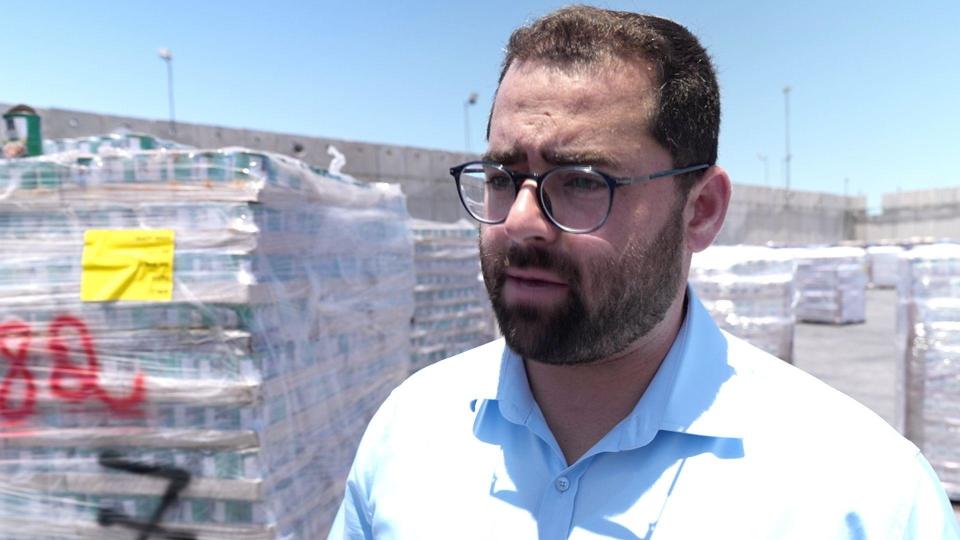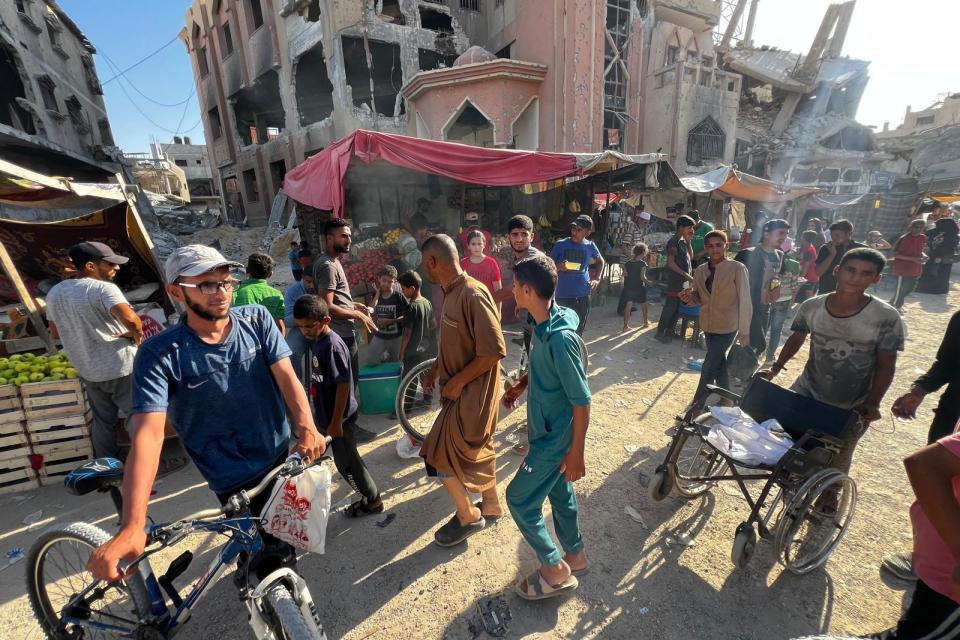Inside Gaza aid depot: Food waits as Israel and UN trade blame

Lying in the sun, on the Israel-Gaza border, just miles from starving Palestinian families, there are hundreds of pallets of food – from packets of rice to bunches of bananas.
Although for the past week Israel’s military has been observing a daytime pause in fighting on a key stretch of road just beyond the main Kerem Shalom crossing point, humanitarian agencies say they are still struggling to get vital aid into southern Gaza.
They blame growing lawlessness for making it too dangerous to pick up and move goods.
“The looting has become quite profound,” says Georgios Petropoulos, head of the UN Office for the Co-ordination of Humanitarian Affairs (OCHA) in Gaza. He estimates that last Tuesday, three-quarters of the goods on board lorries entering from the crossing were stolen.
UN officials say the vehicles are systematically attacked and stopped by armed gangs, particularly those smuggling cigarettes, which are sold on the black market in Gaza for exorbitant amounts. Lorries bringing fuel into Gaza have also recently been targeted.
As Israel’s military offensive has removed Gaza’s Hamas government, there is no plan for how to fill the power vacuum. There are few police officers left working in the Palestinian territory. It is not clear if organised crime cartels are affiliated to Hamas or Gazan clans.
“Meaningful decisions now have to be taken about what we will do for civil order in Gaza and who will take care of delivering that,” Mr Petropoulos says.
On a media tour of Kerem Shalom, the Israeli military body responsible for operating the crossings, Cogat, told journalists it placed no limit on the amount of aid that could go into Gaza. We were shown what was said to be a backlog of more than 1,000 lorryloads of aid which had undergone security checks and were awaiting collection from the Gaza side.
“This is largely due to the fact that international organisations have not taken sufficient steps to improve their distribution capacity,” said Cogat spokesman Shimon Freedman.
He accused the UN – which is the main supplier of aid in Gaza – of having insufficient lorries, as well as needing “to increase manpower, to extend working hours, to increase storage” and take other “logistical and organisational steps”.

During the war, Israel has stepped up its criticism of aid agencies as the International Court of Justice has twice issued provisional measures, ordering it to enable humanitarian assistance to Gaza. These came about as a result of South Africa’s case alleging that Israel was violating the Genocide Convention of 1948, an accusation it strongly denies.
The UN and relief groups rebut claims that they are understaffed or inefficient, pointing to the difficulties of operating in an active war zone. They say Israeli bombings have damaged their infrastructure and reduced their capacity.
“We’ve recruited scores of new staff and hundreds of volunteers to distribute aid. We’ve delivered 28 million meals and six million medical treatments - so [clearly] we can get manpower together,” Sean Carroll, president of American Near East Refugee Aid (Anera) tells me.
But he says increased workers do not help when “the war makes the pickup of goods too dangerous, or roads are impassable. When there isn’t enough fuel and there aren’t enough trucks or parts inside Gaza.”
Anera welcomed a commitment it said Cogat had made this week to allow more lorries to be imported to Gaza, saying it was now campaigning to buy these urgently.
However, Mr Carroll says an ongoing problem remains “the arbitrariness of the rules and procedures, which change constantly” when it comes to moving goods around.
Aid groups stress how the overloaded relief system in Gaza broke down in May when Israel began its military ground invasion in the crowded southern city of Rafah, saying it was targeting remaining battalions of Hamas fighters there.
About a million Palestinians, most of them already displaced by the fighting, were forced to flee, deepening the humanitarian crisis. At the same time, aid organisations lost access to important storage and distribution centres.
Ever since Israeli forces took control of the Palestinian side of the Rafah border crossing, Egypt has prohibited its use, saying it is no longer safe for humanitarian work. Aid and fuel are now being rerouted to Kerem Shalom.
According to UN figures, in May a daily average of 97 aid lorries entered Gaza - a 42% drop on the previous month. In the first two weeks of June, the number had fallen again to 89 lorries.

In nearby Khan Younis, Gazans tell the BBC that no international assistance is now reaching them.
“When we were in Rafah, from time to time, we would see aid. Since we came here, 20 days ago, we haven’t seen anything yet,” says Mahmoud al-Biss, who says he struggles to feed his two children.
Locals describe a vicious circle as increased desperation forces people to loot incoming aid lorries. It appears that some donated items including sunflower oil and sugar are being sold on market stalls.
“Today, the country has become chaotic, we no longer receive aid coupons and when the aid comes, we steal it,” a man called Hassan says.
In an effort to make up the shortfall in goods, the Israeli authorities have begun allowing more private buyers in Gaza to bring in supplies from Israel and the occupied West Bank. Unlike the UN convoys, these lorries use privately contracted armed escorts enabling them to see off attacks. However, a lot of items they bring in are unaffordable for most Gazans.
Israel has opened up three other crossings into Gaza, which all provide aid to the northern part of the strip, where the UN has warned of the highest risk of famine.
International airdrops have now largely stopped but the maritime corridor from Cyprus began to operate again on Thursday. There have been a series of difficulties with a floating pier set up by the US military at a cost of some $230m (£182m), which Mr Petropoulos, from OCHA, describes as “a failure”.
More on Gaza
'A slow death': Gazans live alongside rotting rubbish and rodents
'I don't believe in peace now,' released Gaza hostage tells BBC
The past week has highlighted political resistance in Israel to tackling the dire food shortages in Gaza. This has caused unusual divisions between the government and the army.
When I asked the Israeli military spokesman Rear Admiral Daniel Hagari about the “tactical pauses” near the Kerem Shalom crossing, he said they had been introduced “in order to follow the order of the cabinet to enter humanitarian aid into Gaza.”
He sought to play down what had been a serious backlash, including from the far-right Finance Minister, Bezalel Smotrich. On the social media platform, X, he suggested that allowing more supplies into the Palestinian territory benefitted Hamas, kept it in power and “may pour the achievements of the war down the drain.”
Similar attitudes have also seen extremist Israeli groups attacking aid convoys heading towards the Gaza Strip.
Sean Carroll from Anera says “political reasons” on the Israeli side are partly responsible for difficulties in getting supplies into the territory. “It’s pretty clear there’s a problem and if it were only logistical, it could be solved,” he suggests.
“We have to find a system that works and is based on good faith and that ultimately assumes some trust towards the United Nations,” says Georgios Petropoulos from OCHA.
Back in Khan Younis, men scrambling to buy the basics for their families express their frustration, feeling trapped and exhausted.
“There is no situation more difficult than this,” says Mahmoud al-Biss. “I am displaced, alone with my two kids, trying to survive. There is nobody standing with me.”

